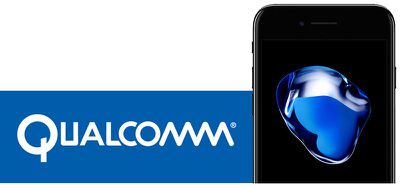Apple owes $7 billion in royalties to Qualcomm since halting payments because of its ongoing dispute with the mobile chip maker over unfair licensing practices, according to a court hearing on Friday (via Bloomberg).
Apple began withholding the payments through its manufacturers last year, after the tech giant filed a lawsuit against Qualcomm claiming that the chipmaker was charging unfair royalties for "technologies they have nothing to do with." However, Qualcomm maintains its technology "is at the heart of every iPhone," and that the royalties are entirely valid.
"They're trying to destroy our business," Qualcomm lawyer Evan Chesler said at the hearing in federal court in San Diego. "They're now $7 billion dollars behind in royalties. The house is on fire and there is $7 billion of property damage right now."
The two companies have been locked in the wide-ranging legal battle since 2017, with Apple accusing Qualcomm of unfair patent licensing practices and Qualcomm accusing Apple of patent infringement.
Apple argues that the mobile chipmaker is forcing it to pay for the use of its chips in iPhones and then again through patent royalties, a practice Apple refers to as "double-dipping." However Qualcomm claims it is doing nothing illegal and that Apple has agreed to the business model for years.
Both Apple and Qualcomm have filed multiple lawsuits against one another, with Qualcomm also seeking import and export bans on some iPhones in the United States and China.























Top Rated Comments
That's part of the issue here. (To be clear, there are many other important aspects of this situation - many other improper or illegal or contract-violative things which Qualcomm has been accused, by numerous parties, of doing and which it has been found, by numerous regulatory bodies, to have done.) According to Apple and others, Qualcomm has long refused to enter into direct licensing agreements on FRAND terms with certain parties - to include Apple - despite the reality that it is required to do so.
Instead, Apple had been paying royalties to Qualcomm through its contract manufacturers. Those manufacturers had licensing agreements with Qualcomm, the terms of which they weren't allowed to disclose to Apple. It was to Qualcomm's advantage to have licensing agreements with those third parties rather than with Apple directly; it was one of a number of things which Qualcomm did - many of which were illegal or contract-violative - which worked together as part of a scheme that allowed Qualcomm to collect greater royalties than it otherwise would have been able to.
The point being, in response to your posts, Apple doesn't have a licensing agreement with Qualcomm which it is now refusing to honor. (That's leaving aside the reality that sometimes agreements are entered into under duress, where one party or the other employs illegal or contract-violative tactics in order to, essentially, force the other party to agree to certain terms.)
Apple has had some other agreements with Qualcomm. Some of them are no longer in force. Indeed, their expiration has much to do with the timing of Apple's legal actions. But, at any rate, they weren't direct licensing agreements which Apple is now violating by withholding royalty payments.
Further, there is nothing wrong with withholding royalty payments (for SEPs) in the absence of a licensing agreement if you have acted in good faith to try to reach one. If would-be SEP users weren't able to do that, the process for creating and adhering to industry standards (for, e.g., certain cellular technology) wouldn't work very well. SEP holders would have too much leverage, even when they were the ones acting wrongly - e.g., failing to honor their commitments to license SEP on FRAND terms. They (each of them) would be able to, in effect, shut down other industry participants. They'd be able to greatly constrain competition and demand exorbitant royalties for IP which might not have much inherent value (i.e. where the IP's value came mostly from its inclusion in industry standards, and where they aren't entitled to collect royalties based on such value). That's why SEP agreements generally limit SEP holders' abilities to take actions to stop the use of their IP, even in the absence of licensing agreements, so long as the users of their IP are willing licensees.
Put simply, Apple will pay Qualcomm the royalties it owes when it is determined what those royalties should be. The proper royalties might be the result of, e.g., a negotiation between Apple and Qualcomm or a court's decision. They won't, e.g., be unilaterally imposed by Qualcomm. That is as it should be.
[doublepost=1540650641][/doublepost]That's one of the issues. But there are many more.
If someone really wants to understand the situation well, they should probably read for themselves things such as: Court filings (from both Apple and Qualcomm and amici and those form other cases, e.g., the FTC's action against Qualcomm) and the findings of various regulatory bodies.
Many people, of course, don't have time for that and / or don't care enough to. That's understandable. We could bullet point some of the issues, and some of us have elsewhere. But that doesn't really have a lot of value if time isn't taken to explain the various issues, why they create problems (or, e.g., are illegal or contract-violative), and how they have worked together to lead to (what many consider) improper results.
[doublepost=1540651191][/doublepost]Part of the reason Qualcomm's modems were, in certain cases, better was that the scheme it had put in place (which included, e.g., refusing to license to competitors in the modem market and effectively charging device makers higher royalties if they used competitors' modems) severely limited competitors' abilities to compete - to, e.g., spend money to develop competitive modems. That wasn't unintentional. Qualcomm tried to use existing market dominance to prevent competition (and, effectively, stifle innovation) and maintain dominance going forward.
That scheme had to be broken up in order to open up competition and for, e.g., Intel to be able to justify spending the kind of money it would need to (and have real world use to guide its R&D) in order for its modems to be competitive. For all intents and purposes, that scheme has now been broken up (though we don't know what some of the fallout will look like). So, going forward, competitors' modems may well compare favorably to Qualcomms'.
If Apple is destroying their business they need a shake up at the executive level.
I agree with Apple they are double dipping. Greedy.
A deal is not a deal when you are getting screwed.
It’s as if somebody boycotted a pop album by buying a metal album. You’re not off the grid — your money’s just going to another massive conglomerate record company instead.
Even Samsung have identified this is a problem and are finally fully transitioning to their own SoCs.